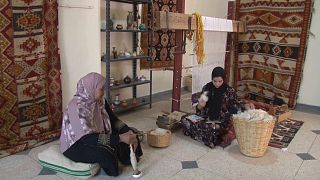Morocco
Once all the boxes containing different types of fish are weighed at the fish market next to Dakhla fishing port, the brokerage begins.
It starts almost every day at 9 am after the arrival of boats which have been out all night fishing.
Representatives of various fish export companies take their places at the fish market to begin the bidding. Each of them proposes a price and whoever gives the best price takes the fish.
This daily event is very quick, taking less than an hour.
Lahcen Aalaw, a fish export company representative in Dakhla who exports to Italy, Portugal and Spain says:
"The maritime brokerage here at the fish market is going very well, there is competition between the buyers, so whoever offers a good price, who has important clients and who has a great experience, it is he who can take the fish."
Dakhla fishing port is one of the country's key ports, generating 65 percent of national fishing production.
The fish market is located next to the port and has been there since 2016. It is among a new generation of large halls such as similar ones in Agadir, Larache and El Jadida.
This kind of seafood marketing infrastructure is beneficial to the quality of the product and also gives transparency to the commercial transactions which take place here.
12 kilometres from Dakhl, is the largest fishing village of Lassarga where the Atlantic Ocean and Oued Eddahab bay meet.
There are a total of six fishing villages in this area which are dedicated to artisanal fishing boats.
More than 3000 of them operate in these fishing villages, including over 1000 in Lassarga alone. They mainly specialise in octopus fishing.
"The fisherman goes out at 2 am after midnight and he stays until 4 pm," explains Mehdi Sheymi, a fisherman in Dakhla.
"Regarding the prices they are variable, in any case this region is very rich in sea resources and in addition to that the authorities always help us."
Almost 4000 tonnes of octopus were landed in Dakhla during the summer, almost 1.5 thousand tonnes of which came from the village of Lassarga.
There are three types of fishing in Dakhla, deep-sea, artisanal and coastal fishing.
For this there are 24 deep-sea fishing vessels and 183 coastal fishing vessels which are monitored by satellite (Vessel Monitoring System).
There are also 11 aquaculture farms, 4 shipping centres and 1 hatchery. Dakhla's aquaculture production for 2019 was 630 tonnes.
Mustapha Ouchkeni, a sea fishing delegate in Dakhla, says investing in extra resources and technology for fisheries has paid off:
'By equipping the fisheries, we are starting to reap the positive results. Equipping the ships with the VMS (Vessel Monitoring System) and aquaculture. These were all projects stipulated in the Halieutis National Strategy, and by establishing the port of Dakhla Atlantic, it will be the best use of the wealth that this region abounds. It will provide us more job opportunities because Dakhla will be the gateway of African countries and on the global level, as well as the USA."
One of the most significant companies in Dakhla's fishing sector is the King Pelagique Group, created in 2004 to fish, process and freeze large quantities of pelagic fish.
It has a unit specialised in treating and freezing fish with a production capacity of 80,000 tonnes per year, and a capacity of freezing up to 250 tonnes per day.
It also has a unit specialised in canning with a production capacity of 500,000 cans per day.
The group has four RSW ships which are equipped with cooling systems in order to maintain the quality of the fish they catch.
"Throughout the production process, the temperature should not exceed 5 degrees centigrade. Then the fish in the tanks are thrown into the water basins, which are also equipped with cooling technologies," explains Jamila Lekouatli, an engineer and technician at King Pelagique Group.
97 percent of King Pelagique Group's production is directed to export.
"Mainly the flagship product that we have, is the canned sardines, for example in the USA today, there are very big sales of them," explains General Manager of the King Pelagique Group, Reda Chami.
Dakhla benefits from almost 700 kilometres of coastline, favourable climate conditions and the country's largest stock of pelagic fish.
And since Dakhla port guarantees 65 percent of national fishing production in volume and 45 percent in value, the surrounding industries are thriving.
AFP













02:25
São Tomé and Príncipe: helping fishers and their future
01:08
Senegal’s fishing crisis: Overfishing, migration, survival
11:32
New discoveries: Ocean census project reveals over 800 new species of ocean life
01:05
Spain says over 550 migrants reach its Canary Islands in past two days
Go to video
Cruise Ship rescues 68 migrants, discovers 5 bodies in Atlantic
02:10
Sustainable Abalone Farming in South Africa